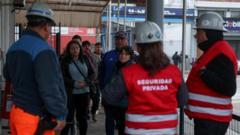Villa Baviera, a town with a chilling history, finds itself at the center of a dispute surrounding government plans to convert part of its land into a memorial for political victims of the Pinochet regime.
**Chilean Tourist Village's Dark Legacy: From Cult to Memorial Site**

**Chilean Tourist Village's Dark Legacy: From Cult to Memorial Site**
A Bavarian-style village concealing a history of abuse and torture seeks transformation into a commemorative site.
In the picturesque hills of central Chile lies Villa Baviera, a village that exudes a quaint Bavarian charm with its red-tiled roofs and manicured lawns. Yet this idyllic facade masks a tumultuous past. Originally known as Colonia Dignidad, it was established in 1961 by Paul Schäfer, a manipulative cult leader whose oppressive regime subjected its German inhabitants to extreme punishments, isolation from their families, and sexual abuse, particularly of children.
Following the military coup by Augusto Pinochet in 1973, this secretive colony became infamous as a site of torture for political dissidents. Many individuals who were arrested during Pinochet's reign met a grim fate here, with families frequently left in anguish over the fates of their loved ones. The horrors of the past remain vivid, as personal accounts like that of Ana Aguayo illustrate the profound impact on victims' families.
In a recent move, the Chilean government announced plans to expropriate 117 hectares of this site to create a memorial for the victims of Pinochet’s regime. The objective is to educate future generations and ensure that such atrocities are not forgotten. However, this initiative has ignited controversy among the fewer than 100 remaining residents, many of whom see it as a threat to their homes and businesses, with some asserting that they too are victims of the colony's dark history.
While some former inhabitants advocate for the change, citing the need to honor and remember the victims, others fear that the government's plans will further displace them from a community that has shaped their identities. A robust debate is unfolding on how best to balance memory, reconciliation, and justice, as survivors like Georg Klaube advocate for memorialization amidst their painful memories.
The Chilean Minister for Justice and Human Rights emphasized the importance of transforming Colonia Dignidad into a space for remembrance and education, aiming to prevent the recurrence of such horrendous crimes. As developments continue, the evolution of Villa Baviera from a troubled past into a place of reflection poses significant questions about healing, historical acknowledgment, and community rights in the wake of atrocity.
Following the military coup by Augusto Pinochet in 1973, this secretive colony became infamous as a site of torture for political dissidents. Many individuals who were arrested during Pinochet's reign met a grim fate here, with families frequently left in anguish over the fates of their loved ones. The horrors of the past remain vivid, as personal accounts like that of Ana Aguayo illustrate the profound impact on victims' families.
In a recent move, the Chilean government announced plans to expropriate 117 hectares of this site to create a memorial for the victims of Pinochet’s regime. The objective is to educate future generations and ensure that such atrocities are not forgotten. However, this initiative has ignited controversy among the fewer than 100 remaining residents, many of whom see it as a threat to their homes and businesses, with some asserting that they too are victims of the colony's dark history.
While some former inhabitants advocate for the change, citing the need to honor and remember the victims, others fear that the government's plans will further displace them from a community that has shaped their identities. A robust debate is unfolding on how best to balance memory, reconciliation, and justice, as survivors like Georg Klaube advocate for memorialization amidst their painful memories.
The Chilean Minister for Justice and Human Rights emphasized the importance of transforming Colonia Dignidad into a space for remembrance and education, aiming to prevent the recurrence of such horrendous crimes. As developments continue, the evolution of Villa Baviera from a troubled past into a place of reflection poses significant questions about healing, historical acknowledgment, and community rights in the wake of atrocity.

















